On July 4th, people across the U.S. will celebrate Independence Day with family and friends. This day commemorates events in 1776 when the Second Continental Congress officially adopted the Declaration of Independence, declaring the colonies’ independence from Britain. While this holiday marks an important milestone in U.S. history, have you ever wondered if or how other countries celebrate Independence Day around the world?
At World Relief, we have the privilege of being in community with people from all over the world. As a multicultural organization, we see God’s fingerprints stamped within each person and people group’s unique makeup — not only in image and likeness but in tongue, tribe, nation and being.
Since 2020, our organization has embarked on an intentional multicultural journey working continually to acknowledge and uncover each employee’s everyday experiences. We (Martine and Todun) were co-chairs of World Relief’s Multi-Cultural Advisory Committee and today, we continue serving as focal points for World Relief’s multicultural work.
One of the ways we can celebrate each other and our cultures is by learning more about the history and places where we each come from. So today, we’re sharing more about independence days around the world and how you can deepen your cultural knowledge and celebrate the beautiful diversity of our world.
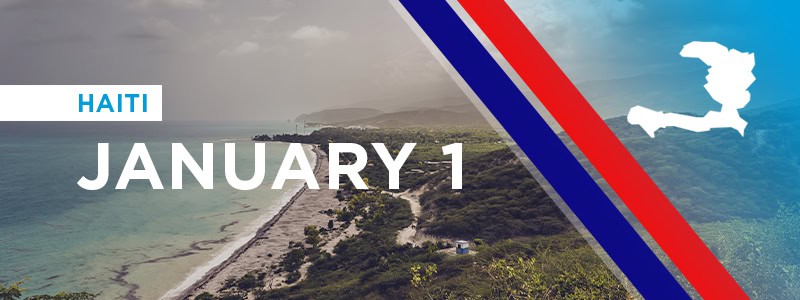
January 1 – Haiti
Although I (Martine) grew up in Brooklyn, my family is from Haiti. The Haitian Revolution took place from 1791-1804 and was led by Toussaint L’Ouvertur and Jean-Jacques Dessalines. Toussaint was a former slave who helped lead a revolution; after his death in 1803 Jean Jacques Dessalines fought many hard battles and was able to declare Haiti a sovereign state on January 1, 1804. It’s important to know that The American Revolution (1775-1783) and French Revolution (1789-1794) were motivating factors and fuel for Haiti to pursue its own freedom and revolt from the French colonist rule.
A small island filled with enslaved black people demanding their freedom led to the only successful slave revolt in the Western Hemisphere. Haiti’s success discouraged Napoleon BonaParte’s agenda of Imperialism and his army retreated.
The Haitian Independence story encourages people to pursue freedom at all costs as opposed to waiting to be rescued. Every year on January 1st all Haitians and Haitian diasporas consume a soup called “Soup Joumou”. This soup represents a period when the French colonists would eat this soup and deny slaves access to eat it. Once Haitians gained their independence from the French, they were able to partake in this “blessing“ soup. This soup is now made and shared with Haitians and their families all over the world. It’s a reminder of the” L’union Fait La Force (Unity Makes Strength)”.
There is beauty in knowing that freedom is for all if we work together. The Haitian people’s unity gave them the strength to fight a strong empire that used imperialism to gain power. It’s a true underdog story. It is the Haitian Independence story that encourages Haitian’s diasporas to honor and celebrate a small but mighty nation every January 1st.
Haitians and diasporas have hope that one day they can enjoy and live in the Land of Mountains again. In honor of the land that is still in turmoil to this day, we continue to celebrate and also pray for Ayit Cheri (Haiti my sweetheart)!
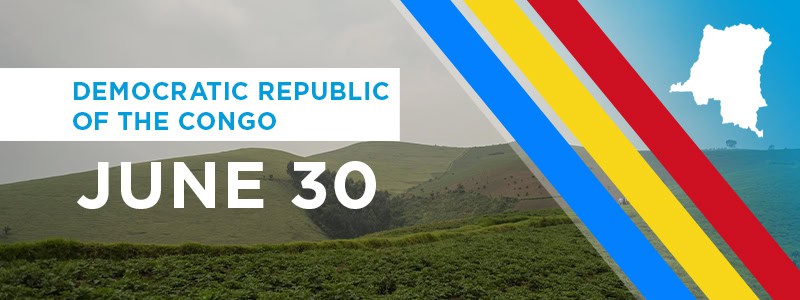
June 30 – Democratic Republic of the Congo
Democratic Republic of the Congo (DRC) celebrates Independence Day on June 30th. In its early history, DRC was known as the Kongo Empire, one of the largest and most powerful states in sub-Saharan Africa. The slave trade and internal rivalries weakened the empire and led to King Leopold II of Belgium taking control of the territory and implementing a period of brutal oppression and forced labor that resulted in the death of over 10 million people. A series of riots upended Belgian rule in 1960 and DRC became an independent country.
Since gaining independence, DRC has struggled with ongoing political unrest, violence and food insecurity. Though the country is one of the wealthiest in the world in terms of natural resources, many people still struggle under the weight of poverty and conflict, leaving many to feel resistant to celebrating. Whats more, thousands of Congolese refugees have resettled here in the U.S. On Independence Day, many of these communities come together to celebrate their culture and give back to the communities that have welcomed them.
“For us in our churches, we pray to God during the whole day at church… Even if we say that we got this independence, we are still facing problems in our country. So, we pray for the country and for our fellow Congolese. Last year, we celebrated independence with some women [in our community], and we had a chance of celebrating with the goveneor. That day, she brought us food. We ate and prayed all day long, and shared the word of God. Then she gave out some clothes to these women to remember our independence.” – Jean Baptiste Kasawo Kubuya, Reverend at Cepac Mugunga Pentacostle Church, DRC
Did you know we are living through the greatest displacement crisis in human history? More than 120 million people across the globe are displaced from their homes.
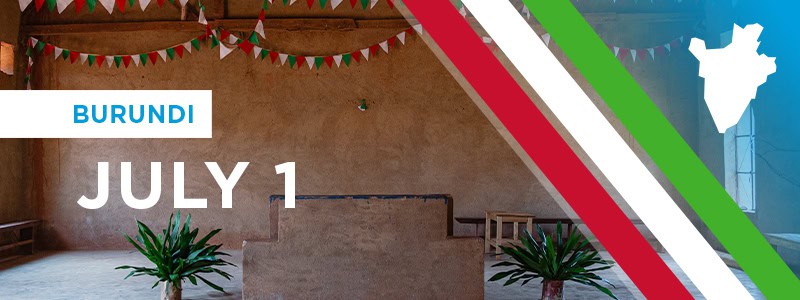
July 1 – Burundi
For most of its history, Burundi was an independent kingdom. In 1890, the territory was colonized by Germany and then later Belgium. On July 1, 1961, Burundi declared independence from Belgium and was governed as a monarchy until 1966. Since then, Burundi has operated as a multi-party republic with an elected government.
Our teammates in Burundi told us that Independence Day is celebrated with great enthusiasm and patriotic spirit in their country. There are fireworks, sports tournaments, community gatherings, cultural events including traditional dances, musical performances, arts and crafts exhibitions and of course — parades.
Every community member is encouraged to join the parade with songs and dances. Everyone listens to speeches given by the President of Burundi and by the late Prince Louis Rwagasore. Rwagasore is known as Burundi’s hero of independence for his vision and work toward a post-colonial, independent Burundi.
“We celebrate this day in total joy by sharing our ideas and pushing our thoughts on the true economic independence of each and every one of us. The holiday is an important day for me because it’s a victorious illustration of the joyous Independence Day that reflects freedom in all aspects of human life.” – Eric Bigirumuhirwe, Child Development Officer, World Relief Burundi
“In families, the elders tell the new generation what they endured during the period of colonization, so that they can appreciate just how important Independence is… The holiday is important for me because it’s a way for all Burundians to celebrate sovereignty, to celebrate the liberation of our grandparents, to prevent the traumas that our grandparents may develop as a result of the bad situations they suffered by telling us their stories…” – Emmanuella Nkuzimana, Monitoring & Evaluation Assistant, World Relief Burundi
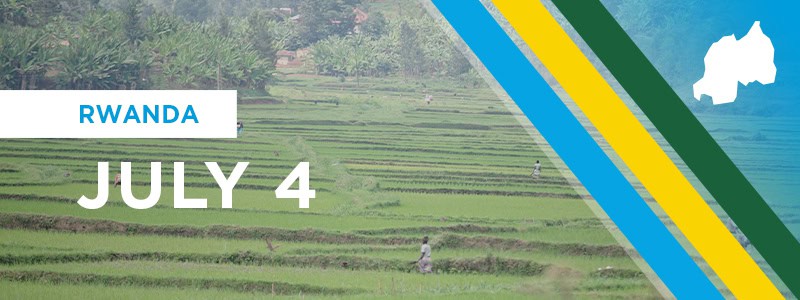
July 4 – Rwanda
Like Burundi, Rwanda gained independence from Belgium on July 1st, 1962. While Independence Day is a nationally recognized holiday in Rwanda, Rwandans incorporate Independence Day celebrations with Liberation Day celebrations on July 4th.
Liberation Day, or Kwibohora as it’s known locally, commemorates the end of the genocide against the Tutsi that took place in 1994. The holiday celebrates both independence and unity as it marks the day post-colonial Rwanda began moving forward as a unified country and a unified people. The New Times Rwanda discusses these two holidays more in this short video.
“Independence is a public holiday on the first of July, but its celebration is combined with Liberation Day on the 4th of July. During the event, we celebrate unity, accountability and the nation. The independence holiday is important to us since it helps younger generations to know more about the history of the nation and get involved in developing the country.” – Albert Nzacahinyeretse, Church Empowerment Zone Manager, World Relief Rwanda
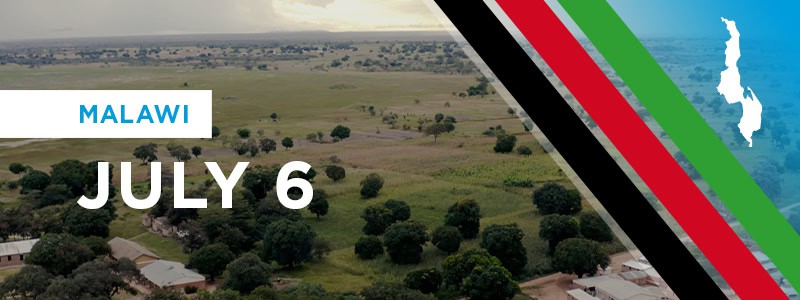
July 6 – Malawi
Independence Day, also known as Republic Day, in Malawi is celebrated on July 6th, commemorating events in 1964 when Malawians achieved freedom after 80 years of British colonial rule. And while this is indeed worth celebrating, our teammate in Malawi, Martha Mwimaniwa, reminded us of the need to work toward and celebrate continued progress toward freedom and liberation in her country.
Martha said, “When l think of independence, the word liberation comes to mind. I believe the day a country becomes independent certain freedoms must be a given. For example, freedom of trade and speech. I also think a lot of time has passed since July 6, 1964, and the only celebration should not be based on colonial liberation [alone] but should come from the achievement of trade and speech freedom.”
Today, as Malawi continues progressing as an independent country, Independence Day is celebrated nationally with parades, speeches, a football match and national day of prayer and worship. Schools are often closed and families gather to eat traditional dishes like thobwa, nsima and futali. In 2024, Malawi will celebrate 60 years of independence.
“Independence day offers me an opportunity to reflect back from where we are coming from as a nation and be able to anticipate the future with great joy and care. While avoiding repeating the previous mistakes of falling in the hands of pre-colonial masters.” – Major Ntchafu, World Relief Malawi
“During Independence day I am reminded of my responsibility towards my country. In addition, my mood on this day is filled with pride and I have a sense of freedom which we so carelessly take for granted.” – Limbikani Msamala, World Relief Malawi
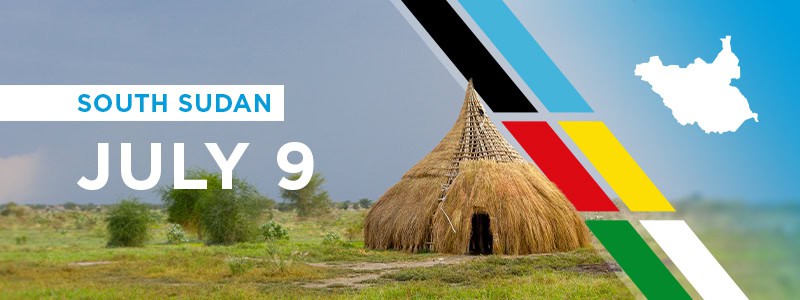
July 9 – South Sudan
South Sudan, the world’s youngest country, celebrates Independence Day on July 9th. After decades of civil war between north and south Sudan, the country voted for secession from Sudan in 2011, establishing itself as an independent country. At the time, South Sudanese citizens felt great hope and expectation for their future.
Since gaining independence, the country has struggled with ongoing civil conflict, which has cast a shadow over national celebrations, and unofficially has cost over half a million lives. No official festivities have been held in the nation’s capital for several years. Nevertheless, local communities still gather to celebrate this important day with ceremonies that include song, dance and commemorative speeches, marking a hopeful spirit that one day South Sudan will be a country of peace.
World Relief’s mission is to boldly engage the world’s greatest crises in partnership with the church. Founded in the aftermath of World War II, we’ve been doing work for more than 80 years.
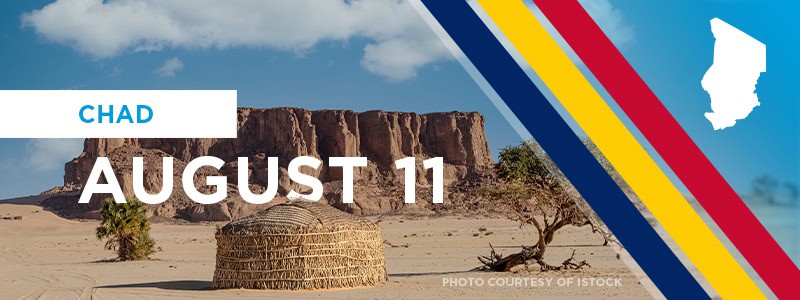
August 11 – Chad
After 60 years of French colonial rule, Chad officially gained independence in 1960. Prior to French rule, Chad did not exist as a defined, politically recognized country. Instead, the region was home to multiple kingdoms, chieftains and sultanates. After gaining independence, Chad struggled to find a cohesive national identity as more than 200 ethnic groups speaking more than 100 languages coexist within Chad’s borders. Nevertheless, progress has been made as the country continues to develop.
Today, Chadians observe Independence Day on August 11. Our colleague Félicité, told us that preparations are made in advance by administrative and traditional authorities. Different groups and tribes are invited to a ceremony, the roads are cleaned and flags are placed all over the town. Before the celebrations kick off, the President gives a speech proclaiming the day as the day of independence which everyone listens to over the radio or on the TV. Afterward, everyone moves to the “site of independence” where the celebrations are had. The authorities give speeches, and folk dances, horse races and theatrical performances are held for everyone to see.
Additionally, Félicité said that some prisoners are pardoned from their sentences, and others are given reduced sentences on Independence Day. The celebrations continue throughout the entire day.
“This day is important because it marks a new chapter of the Chadian nation. Independence was returned to the Chadian people and no longer belongs to others. Foreign nations do not decide Chad’s future, but instead new authorities who are themselves Chadian get to decide and develop a destiny that is unique to the desires of the people.” – Félicité Denenodji, Logistics Officer, Abéché Sub-Office, World Relief Chad
.
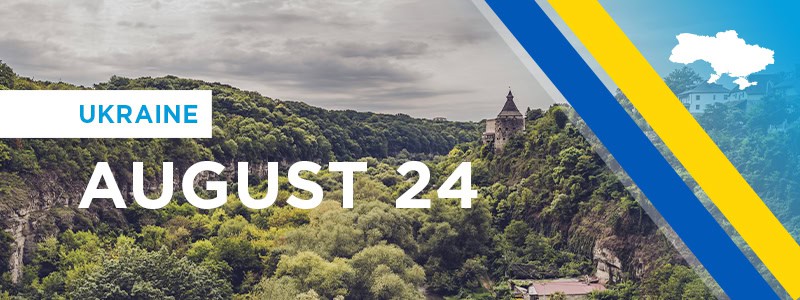
August 24 – Ukraine
In the 1920s, following World War I and the Russian Revolution, most of Ukraine became a part of the Soviet Union. On August 24, 1991, Ukraine declared independence and the Act of Independence was confirmed with 90% of people voting in favor. Soon after, the Soviet Union was dissolved. The well-known blue and yellow flag was adopted as a national symbol, representing the landscape of Ukraine — the blue stripe represents the sky above and the yellow stripe represents the endless fields of wheat beneath it. Today, to wear or paint the flag speaks of the “unbreakable spirit and dignity, devotion to the native land, and love for freedom to each Ukrainian”.
Historically, Ukrainian Independence Day has been an important reminder of democratic values in the country. Since 2022, however, Independence Day celebrations have been much more subdued as Ukraine battles against the Russian invasion. In 2023, President Zelensky attended a ceremony on Independence Day where he commemorated those who had lost their lives in the war and vowed to keep fighting for Ukrainian Independence. Listen to a portion of his speech.
“Every day I feel happy to be a Ukrainian, but this is especially so on our Independence Day on August the 24th. It is a special day when the country comes together to celebrate our unique traditions, language, culture and sovereignty. In light of the recent events in my country, the importance of this day to us has only increased.” – Olga Litvinenko, Mental Health Care & Psychosocial Support Officer, World Relief Ukraine
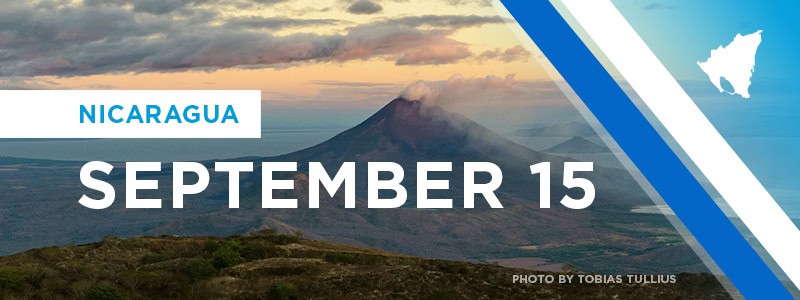
September 15 – Nicaragua
Every September, Nicaragua celebrates National Day, which might be better referred to as “National Month” because festivities begin on September 1st and continue throughout the rest of the month.
National Day celebrations commemorate two different events in Nicaragua’s history. First, September 14th marks Nicaragua’s victory against American troops led by William Walker. In April 1856, Walker “organized a private military expedition to Latin America. He took advantage of a civil war in Nicaragua to take control of the city of Granada and declare himself president.” Thankfully, a small band of Nicaraguan troops banded together to defeat Walker in an important step to take back control of their country.
Second, September 15th marks Nicaragua’s independence from Spain in 1821. This date is also celebrated by Guatemala, Honduras, El Salvador and Costa Rica as they, too, gained independence from Spanish conquest. You can read more about both holidays and how they are connected here.
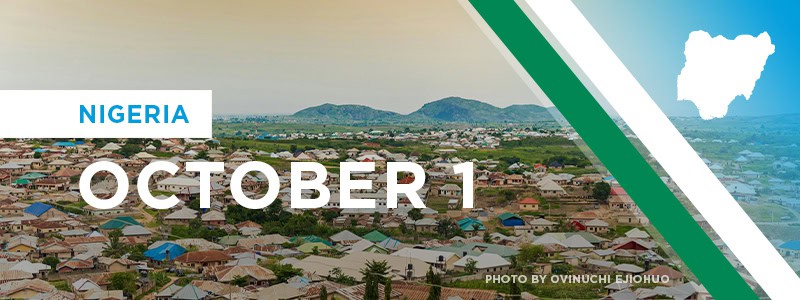
October 1 – Nigeria
While World Relief has offices in 13 different countries including an administrative office in Nicaragua, a multitude of other countries are represented by our staff, volunteers and program participants through our work in places like the U.S. For example, I (Todun) am from Nigeria.
Every October 1st is a public holiday in Nigeria. The country celebrates the anniversary of its independence from British Colonial rule on October 1st, 1960. Though the journey toward building a stable, democratic and prosperous nation has been marked by both progress and setbacks, this reflects the complexities of Nigeria’s diverse society and its post-colonial legacy.
Before moving to the United States, I remember Independence Day celebrations including schools celebrating Nigerian cultures with students wearing outfits from different Nigerian cultures. Schools also hosted different educational programs to educate people about Nigeria’s history and democratic values; educational competitions like debates, essay competitions and quizzes were held; and families participated in various public gatherings like picnics, barbecues and beach visits. Independence Day is always a time when citizens come together to celebrate a time of renewal and hope for a better Nigeria.
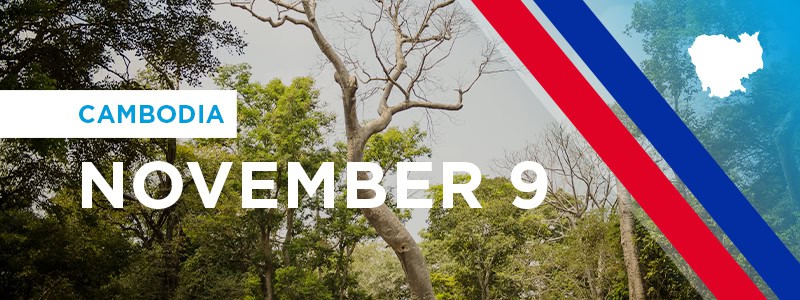
NOVEMBER 9 – CAMBODIA
Cambodia celebrates Independence Day on November 9th. In 1953, Cambodia gained independence from France under the leadership of then-Prince Sihanouk. According to the Phnom Pen Post, “the King considered it his royal duty to gain independence for the nation. People from all walks of life joined his ‘citizenry militia’” in the move toward independence.”
On November 9th, people across the country gather together for joyful celebrations. Official celebrations take place at the Independence Monument in Phnom Penh. Roads around the monument are closed and ceremonies are broadcast on television and radio so everyone can participate.
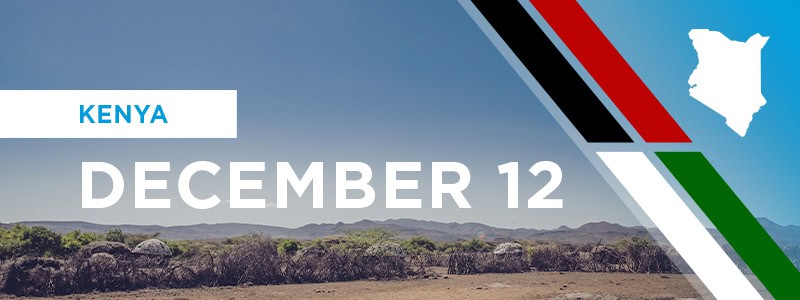
December 12 – Kenya
On December 12, Kenyans celebrate Jamhuri Day. After a decades-long fight for freedom, Kenya gained independence from Great Britain in 1963, and a year later, in 1964, was admitted into the commonwealth as a republic.
Jamhuri, which means “republic” in Swahili, has immense meaning in Kenya’s history as an independent nation. According to our teammates in Kenya, it’s a very nostalgic celebration in remembrance and commemoration when the colonial British flag (aka the Union Jack) was lowered and the iconic Kenyan flag was raised on Mt. Kenya. The Kenyan flag has four symbolic colors: black for the people, green for agriculture, white for peace and red for the blood shed during the fight for freedom. The flag also features a shield and spears as the court of arms.
National celebrations often include feasts, political speeches, parades and dancing. Many Kenyans gather with their families to watch the national celebrations on TV before spending the afternoon in celebration together. In 2023, as part of the 60-year commemoration, the Tourism and Wildlife Cabinet opened Kenya’s vast network of national parks for free admission on Jamhuri Day.
In addition to celebrating Jamhuri Day, Kenyans also celebrate Mashujaa Day on October 20th. “Mashujaa,” which means “heros” in Swahili, is a day when all the heroes and heroines are feted for their contributions to the development or welfare of all Kenyans.
“Jamhuri for me is a significant occasion that we celebrate the Kenyan journey to independence and attaining our status as a Republic. The trooping of the bright military colors adds flair to the day’s celebration experience. The fun fare of dances in traditional costumes usually enthralls with the rich cultural heritage on show, is a massive appeal to both young and old.” – Timothy, Logistics Officer for Turkana Church Empowerment Zone, World Relief Kenya
We hope this blog is a helpful step in your journey toward learning more about the cultures you’re connected to through World Relief.
As we think about the diverse cultures represented in this blog and beyond, we are reminded God’s vision for a multicultural world in Revelation 7:9-10:
There was a great multitude that no one could number, from every nation, from all tribes and peoples and languages, standing before the throne and before the Lamb. They were wearing white robes and were holding palm branches in their hands. And they cried out in a loud voice: “Salvation belongs to our God, who sits on the throne, and to the Lamb.”
With faith and understanding, we can uncover, share and celebrate our lived experiences as together, we build a world of thriving, welcoming communities where families flourish and people experience restorative relationships with God, themselves and others.
Your gift to World Relief responds to humanitarian crises and builds thriving welcoming communities where all people can flourish.
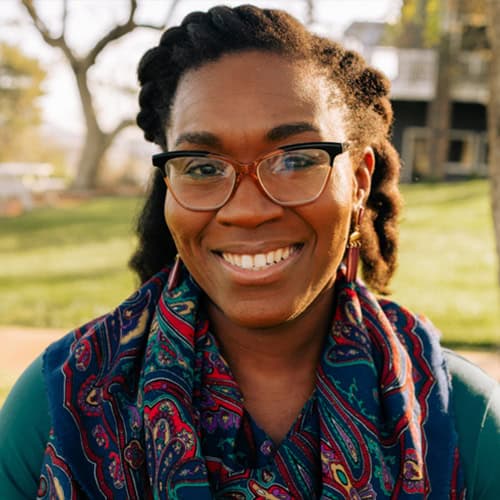
Martine Decase is a first-generation American. Her family is from Haiti. She grew up in Brooklyn, New York, and currently resides in Chicago with her husband Miguel, and their three children. Martine majored in economics at Long Island University and received a Master’s in Public Administration with a concentration in nonprofit management at DePaul University. Since the 9th grade, Martine has felt God’s call on her life to work in the nonprofit sector. Martine says she believes that working in the nonprofit sector allows her to do good work, but doesn’t make her good. “Anything I accomplish is essentially for His namesake and is a small reflection of how good Christ has been to me.”

Todun Afolabi joined World Relief in 2018 and currently serves as the U.S. Volunteer Engagement Manager. With a background in law, she is passionate about humanitarian efforts and engaging communities in their stories of change.

